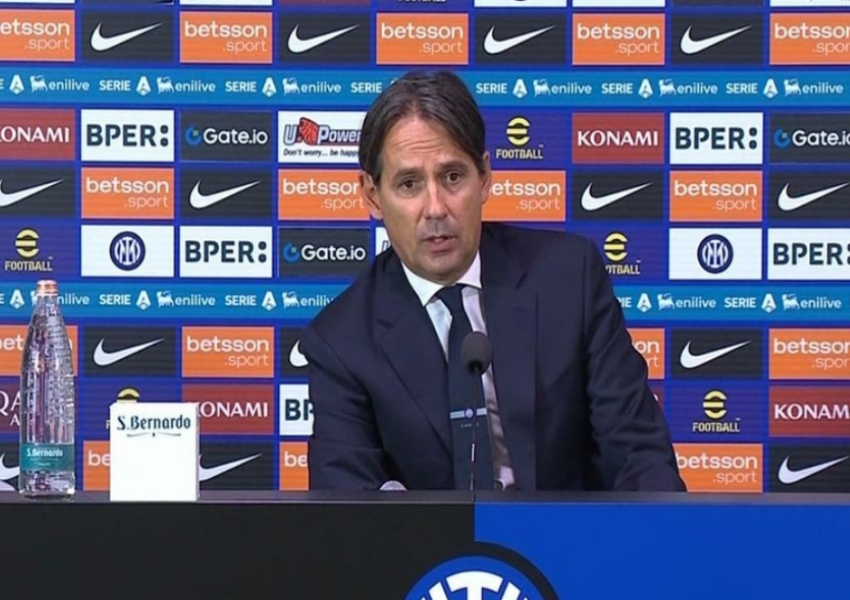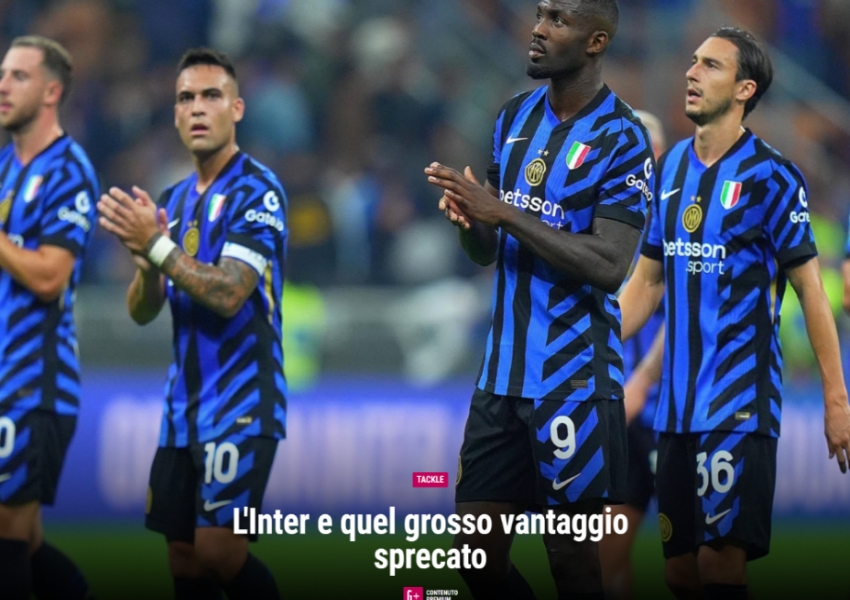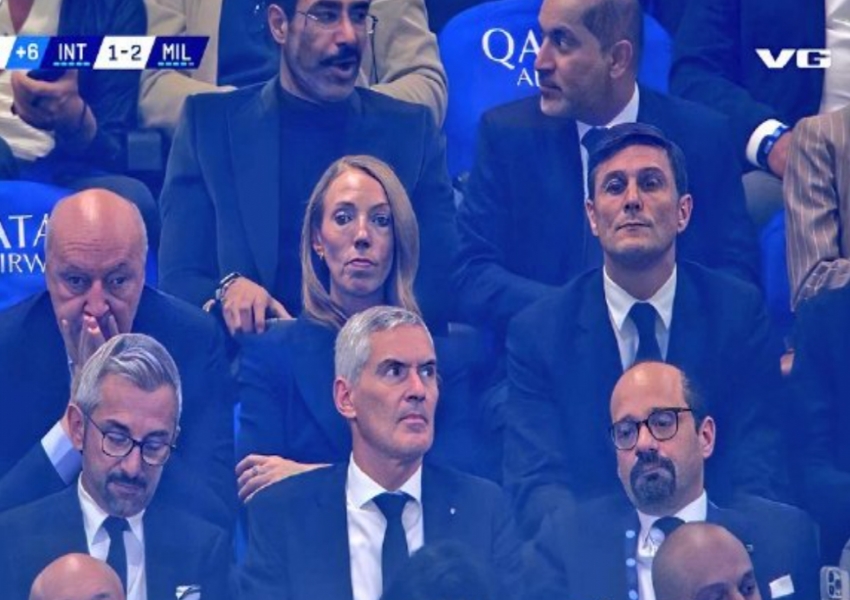Inter’s Season Strategy Unchanged: Champions League Above All Else – Insights from Two Internal Meetings
In the aftermath of Inter Milan’s loss in the Milan Derby, details about the club’s internal workings before and after the match have come to light, with Italian media outlets like La Gazzetta dello Sport providing a closer look at how the team is navigating its season. Head coach Simone Inzaghi's preparation methods, the internal dynamics within the squad, and the management’s vision for the season have been heavily scrutinized. Despite the derby defeat, the club’s leadership has made it clear: the strategy remains unchanged. Inter will continue to push on both the domestic and European fronts, with a particular focus on the Champions League.

Pre-Derby Preparations: Different Approaches, Different Outcomes
Ahead of the derby, the contrasting approaches of the two coaches were highlighted in the media. Inzaghi had his entire squad stay at the team’s training base the night before the game, ensuring that they could go over tactical plans and review recent performances of their opponents. His intent was to maintain focus and minimize distractions. On the other side, AC Milan’s coach Paulo Fonseca allowed his players to spend time with their families the night before the match, trusting that this would keep the players calm and relaxed.

As the dust settled after the game, criticism poured in for Inzaghi’s decision to keep the team isolated, with many suggesting that this only increased the players’ anxiety. Critics argued that Fonseca’s method of encouraging tranquility led to Milan’s superior performance in the derby. Inzaghi, on the other hand, took full responsibility for the defeat, stating publicly that he bore the brunt of the blame. Yet, a different narrative emerged from the players, who acknowledged that they had failed to execute the coach’s instructions on the pitch.

This admission by the players suggests that the pre-match arrangements were not necessarily flawed. The problem wasn’t the tactical preparation but the inability of the players to deliver what had been rehearsed, possibly due to fatigue or mental strain. Following the loss, Inzaghi gave his squad a day off to recuperate before resuming training, but bad news followed quickly. Key midfielder Nicolò Barella picked up a muscle injury that could sideline him for up to three weeks, compounding Inter’s problems as they try to bounce back from the derby defeat.
Post-Derby Meetings: Addressing the Fallout
Two key internal meetings were held in the days after the loss, drawing the attention of fans and media alike. The first involved Inzaghi and his players, during which the coach analyzed the reasons behind the team’s poor performance. The second meeting was a high-level discussion between Inter’s board, including executives like Giuseppe Marotta, Piero Ausilio, and Javier Zanetti, and the coaching staff. The focus of this session was clear: to communicate the club’s unwavering objectives for the season, even after the setback against AC Milan.
Reports indicate that the club’s top brass reiterated a firm stance: the loss in the derby does not alter Inter’s primary goals. The team is expected to compete vigorously on two fronts — the domestic league and the Champions League. Management stressed that the Derby della Madonnina, while painful, should not derail the broader ambitions of the club. Their message was resolute: Inter must move forward, targeting success both in Serie A and Europe. The club’s leadership also encouraged Inzaghi to take a more creative approach to squad rotation, a recurring theme of criticism directed at the coach throughout his tenure.
Before resuming training on Tuesday, Inzaghi and the players held a frank discussion where the coach once again took accountability for the derby loss. The players, however, echoed their earlier sentiments, acknowledging that the team had failed to implement the instructions given during the tactical sessions. This mutual acceptance of responsibility seemed to galvanize the squad, with players pledging to return to the pitch with a renewed sense of determination. The consensus was clear: Inter must work harder, regain physical fitness, and improve their attitude in order to quickly recover from this rough patch.
The players and the coaching staff agreed that, moving forward, Inter would not only aim to pick up crucial points in the domestic league but would also strive to achieve success in the Champions League. The atmosphere in the camp was one of unity and resolve, with both coach and players convinced that the team could turn its fortunes around.
External Criticism: The Question of Priorities
Despite the internal unity, criticism has been rife on social media, with many fans and pundits pointing the finger directly at Inzaghi. A particularly popular narrative suggests that Inzaghi sacrificed valuable points in Serie A by focusing too heavily on the Champions League, with some accusing him of prioritizing a draw against Manchester City over domestic results. This strategy, they argue, is what led to the disappointing derby loss, and some even question whether Inter should have taken a more pragmatic approach in the early stages of the Champions League.
When the group-stage draw for the Champions League was made, several analysts advocated for Inter to focus more on their domestic league and less on Europe, at least in the early phase. The reasoning behind this was simple: to finish in the top eight in the first phase of the revamped Champions League would likely require around 17 points, or five wins and two draws from eight group-stage matches. Such a target would demand significant resources and focus, potentially detracting from Serie A performances.
However, if Inter’s goal was only to finish in the top 24 — a position that would still qualify them for the next phase — the points requirement would be far lower, possibly seven or eight points. In this scenario, the pressure would be much less, allowing the club to focus more on crucial Serie A encounters, especially with rivals like Thiago Motta’s Bologna and Fonseca’s AC Milan pressing for top spots in the league. In light of the derby defeat, these voices have grown louder, with some already calling for Inzaghi’s resignation. The hashtag “InzaghiOut” has trended online, despite the coach’s historic success at Inter, including leading them to the Champions League final last season.
But while public sentiment may be turning against Inzaghi, the club’s leadership has made its stance abundantly clear. The two internal meetings following the derby reaffirmed the dual ambition for the season: Inter must fight on both fronts, with no room for compromising either competition. This, in itself, sends a strong message: the Champions League is the club’s top priority, and any suggestion of focusing solely on Serie A has been dismissed.
The Inzaghi Conundrum: Rotation and Fatigue
For Inzaghi, the upcoming months present a formidable challenge. The Inter manager has long struggled to effectively rotate his squad, an issue that has plagued him throughout his coaching career. Last season, despite reaching the Champions League final, Inter dropped a record number of points in Serie A, a direct consequence of their grueling European campaign. While they eventually earned a second star by winning the Scudetto, their performances in Europe fell short of expectations in other seasons under his reign.
Now, the pressure is mounting. The current squad is aging, and key players like Barella have already picked up injuries, making the need for effective rotation even more pressing. Italian media has not been kind to Inzaghi, with pundits listing a litany of issues, ranging from tactical inflexibility to poor squad management. These criticisms are unlikely to fade away anytime soon, especially if Inter continues to struggle with fatigue and injuries as the season progresses.
One notable commentary came from Italian football analyst Biaxin, who defended Inzaghi, stating: “A surprise Champions League final; a dominating title run; the most entertaining football in years… Yet, one derby loss, after six straight wins, and suddenly the critics are awake. What did he do? Curse at them? No, he took responsibility.” This reflects a growing sentiment that while Inzaghi certainly has his flaws, the broader issues at Inter are not solely down to the coach. The club’s management and ownership also bear responsibility for the structural problems within the squad.
As Inzaghi navigates the complexities of the season, he is likely to remain under intense scrutiny. The manager’s ability to juggle the demands of two highly competitive fronts — with an aging squad and mounting injuries — will be put to the test. Fans may call for change, and the media may continue to pile on the criticism, but one thing is clear: Inter’s leadership is backing their coach, for now, and the Champions League remains the focal point of their ambitions.
Copyright Statement:
Author: mrfootballer
Source: Mrfootballer
The copyright of this article belongs to the author. Reproduction is not allowed without permission.
Recommended Blog
- Inter Milan Reaps Success but May Have a Surprise in Store: New Signing Palacios Set to Follow Bisseck’s Path
- Juventus' Injury Crisis and Emergency Plan Show the Way for Inter: New FIGC Ruling a Golden Opportunity
- AFC World Cup Qualifiers: Australia Finally Welcomes the Rain, Saudi Arabia and Japan Clash Over 3-Back Formations
- Inter’s Sporting Director Scouting Three Monza Talents: Winter Moves Could Bolster Nerazzurri Strengths
- Europa League Round 2: Lazio Shines on Two Fronts, While Can Ten Hag Save Himself at Manchester United?
- The Inter Milan Curva Nord Scandal: Money Over Loyalty, Distracting the Team Before the Champions League Final, With Zanetti Under Fire
- UEFA Champions League Round 2: Real Madrid Must Learn to Defend the Lead, Liverpool's Curious Struggles Against Italian Sides
- Two Legendary Traits Reborn in Taremi: The Three Wings He Adds to Inter Milan
- Inter Milan Reports €36 Million Deficit for Last Season: Detailed Breakdown of New Ownership’s €47 Million Capital Injection
- Europa League Round 1: Manchester United Boss Seeks Respite, Hoffenheim Eyes Bundesliga Standings
Hot Blog
- Champions League Quarterfinals Set: Arsenal Crush PSV 9-3, Villa Dominate Brugge 6-1! Real Madrid vs. Arsenal Confirmed
- Champions League Drama: Rare Penalty Violation! VAR’s Eagle Eye Turns 60,000 Cheers to Silence
- Vinícius Jr. Misses Crucial Penalty as Atlético Fans Erupt – Bellingham Offers Consolation in Madrid Derby Thriller
- Champions League Quarterfinals Set to Take Shape – Arsenal and Villa Poised to Advance, Real Madrid in Strong Position, Dortmund Facing an Uphill Battle
- Real Madrid Survive Atlético Thriller: Win 4-2 on Penalties to Set Up Quarterfinal Clash with Arsenal
- 1-4! 0-4! A Dark 24 Hours for Chinese Football – Shanghai’s Giants Humiliated and Eliminated from the AFC Champions League
- 4 AM Showdown: Manchester United’s Do-or-Die Battle – Defeat Means Elimination and a Trophyless Season
- Man City’s 21-Year-Old Star Returns Home as a Hero! Receives $350,000 Mercedes, Gifts It to His Father
- AFC Champions League Quarterfinal Draw: Yokohama Faces CR7! Two High-Stakes Clashes as Japan’s Duo Battle in the Bottom Half
- Barça Unleashed: 26-Minute, 4-Goal Comeback Stuns Atlético as Flick’s Masterclass Makes History